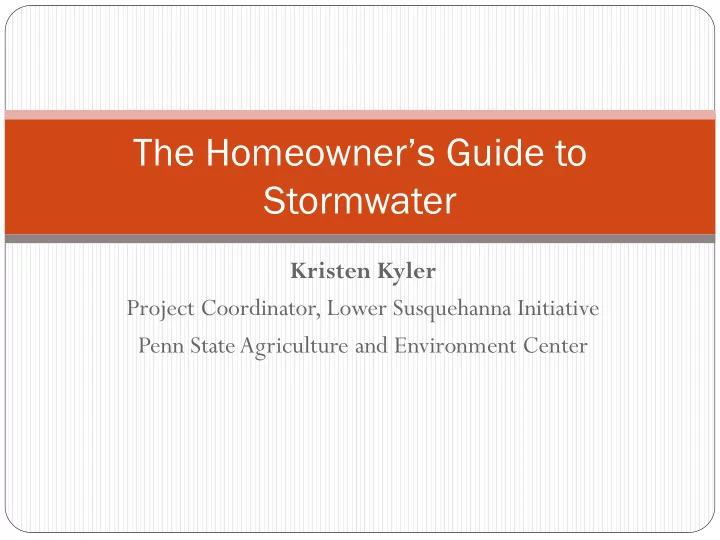

The Homeowner’s Guide to Stormwater Kristen Kyler Project Coordinator, Lower Susquehanna Initiative Penn State Agriculture and Environment Center
BACKGROUND Little Conestoga Partnership (Alliance for the Chesapeake Bay, • Brandywine Conservancy, Pennsylvania Landscape and Nursery Association, Penn State, Chesapeake Bay Foundation, Lancaster County Conservancy, Habitat MT, Little Conestoga Watershed Alliance, PA DCNR, PA DEP , Lancaster County Planning Commission, Lancaster County Clean Water Consortium, Lancaster County Conservation District) National Fish and Wildlife Foundation grant • Conewago Creek Initiative • Incentives Programs •
THE HOMEOWNER’S GUIDE TO STORMWATER • What is stormwater and why it is a problem? • How does stormwater flow on your property? • How much stormwater is generated on your property? • What can you do?
WHAT IS STORMWATER ? Stormwater runoff is simply rain or melting snow that “runs off” of the land and into storm drains and creeks.
FOREST vs. TURF GRASS vs. PAVEMENT
FOREST vs. TURF GRASS vs. PAVEMENT
WHY IS STORMWATER A PROBLEM?
Flooding
Pollution
Streambank Erosion
Threats to Human Health
If you want to do something to help, the Homeowner’s Guide to Stormwater is a good first step. We all have an impact.
STEP 1: MAP YOUR PROPERTY Include : • Property Boundary • Buildings • Sidewalks/driveways and other impervious areas • Lawn and maintained landscaping • Natural areas • Water
STEP 2: MAP STORMWATER FLOW Include : • Downspouts • Stormwater flow paths • Areas of ponding • Gullies and ditches
STEP 3: ESTIMATE STORMWATER Page 6:
THE 6 PRACTICES • Rain Garden • Rain Barrel/cistern • Pervious pavers • Tree planting • Riparian Buffer • Native Meadow
RAIN BARREL
PERVIOUS PAVEMENT
TREE PLANTING
RIPARIAN BUFFER
NATIVE MEADOW
RAIN GARDEN
STEP 4: CHOOSE YOUR PRACTICES Things to consider: • How much space is available • Wildlife and insects • Beauty • Water usage • Shade • Time/maintenance
STEP 5: SELECT & MAP PRACTICES Things to consider: • Depth to bedrock • Water ponding locations • Proximity to foundation • Wells and septic systems • Slope • Soil percolation
PUTTING THE PLAN INTO ACTION Lots of resources available online • 50 websites listed • http://stormwater.allianceforthebay.org/ • Native plant nurseries • Workshops •
HEALTHY LAWN CARE PRACTICES Soil Test • Dense vegetative cover • Low fertilizer usage • Mulch and retain clippings • Proper fertilizer time • Slow release N fertilizer • 3 inches or taller • Sweep fertilizer off hard surfaces • 15-20 ft buffer •
THE DIFFERENT VERSIONS Paper Copy • YouTube Video • https://www.youtube.com/watch?v=4qIUcO • UFchg Online Tool • www.stormwaterguide.org •
Questions??? Kristen Kyler Project Coordinator, Lower Susquehanna Initiative http://agsci.psu.edu/aec klk343@psu.edu 717-948-6609
Recommend
More recommend